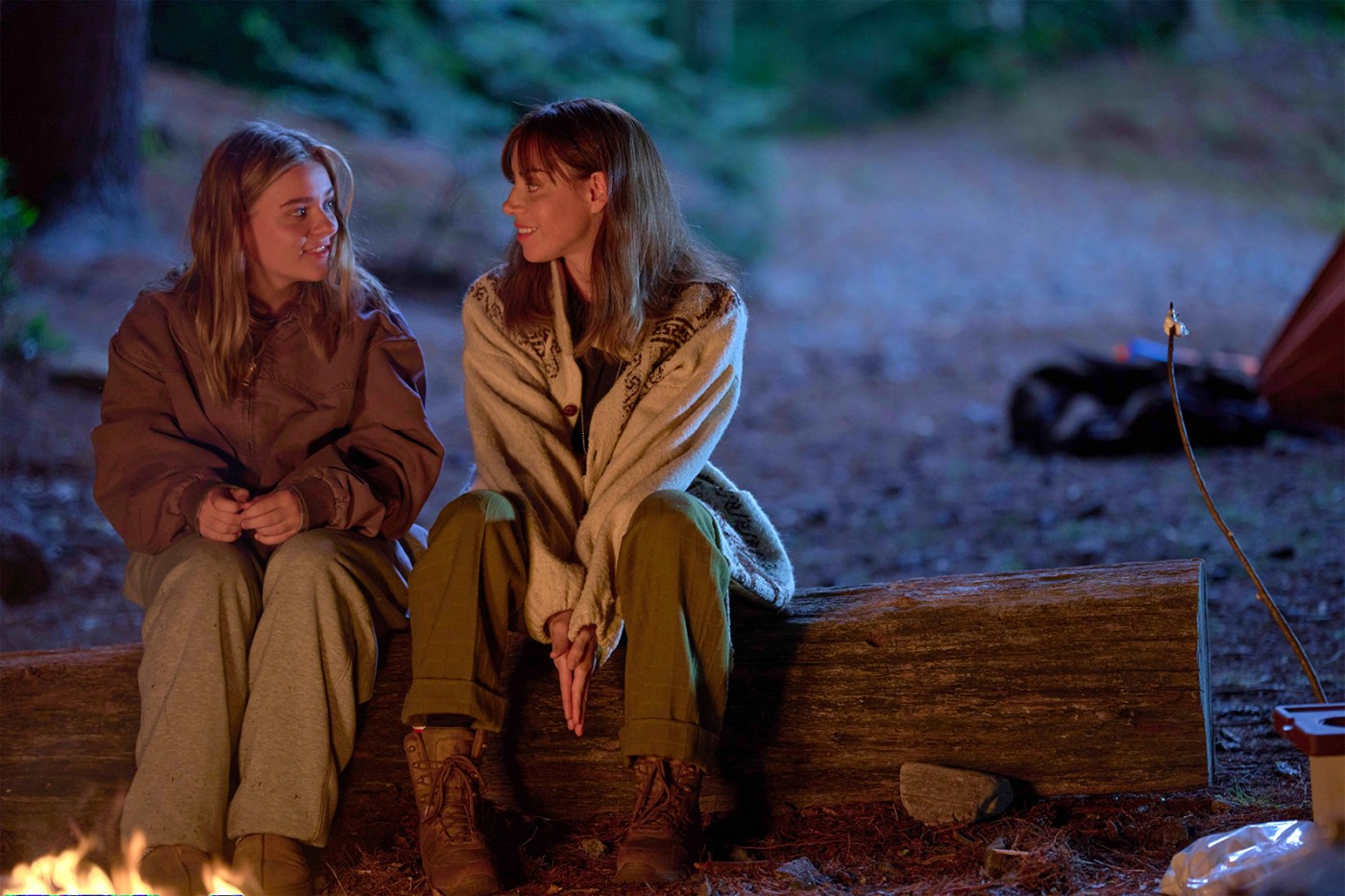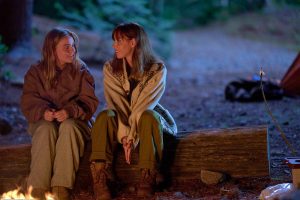
How the film ‘My Old Ass’ takes an unlikely premise to a surprising place
When Elliott, played by Maisy Stella, skips a family birthday dinner to take magic mushrooms with her friends in the woods, it may feel like a set-up for a coming-of-age comedy. And on one level, “My Old Ass” is precisely that: a funny look at Elliott at a turning point in her life when she meets Chad, played by Percy Hynes White, just before she leaves her small-town home for college in the big city.
Yet at the Sundance Film Festival this year, audiences were weeping, too. The movie’s hook is that, as she’s tripping, Elliott meets an older version of herself played by Aubrey Plaza, who offers some hard-to-follow advice to her younger self. As old and young Elliott — who manage to maintain a connection even after the drugs wear off – face up to what life has in store, the laughter turns to poignant tears.
The film, in theaters Sept. 13, is just the second by Megan Park, an actor whose acclaimed writing and directing debut, “The Fallout” concerned a high school student (Jenna Ortega) struggling with trauma after surviving a school shooting.
Park spoke by video recently about capturing the language of teens and finding the story in the editing room. This interview has been edited for length and clarity.
Q. Did you start with the idea of a teenager at a pivotal moment or the conceit of the mushroom trip and meeting your older self?
As a writer, I’m emotion-led. “The Fallout” came from my frustration and anger at the idea of American high school students having to constantly exist with the possibility of school shootings. For this movie, I was home in my childhood bedroom during the pandemic and had had a baby and I was feeling nostalgic. I had that feeling that comes in the scene where Chad talks about the last time you play with your friends as a kid and you don’t realize it’s the last time. That made me want to explore that idea of the older and younger self. The mushroom trip idea came when I was trying to figure out how to make that happen.
Q. Among the movie’s many fantastic qualities is dialogue that’s pitch-perfect for teens. Do you have a natural ear or did you give your young actors input?
I started out acting, so I’m a stickler for dialogue and when I’m writing I say it out loud to make sure it flows. You have to know what you know and what you don’t know.
I try to ground it and make it authentic, but I’m not 18 so I try to be open-minded and try to really include the actors: “Is that joke funny or is there another phrase you’d say instead?” It’s an open line of communication every step of the way and they’re so helpful and always checking for me how relatable it is.
And we did scripted takes but also a lot of “fun-runs” and the chemistry between Maisy and Maddie Ziegler and Kerrice Brooks as her best friends was really natural and created great moments organically.
Q. Do those improvised “fun-run” moments end up on screen or is it more that they create chemistry that fuels the scripted material?
It’s both. A lot of times it’s the runway to get the script down but there were moments that stayed in, especially ones that just started with Aubrey saying something and then they’d go off. And it was Kerricet’s first movie but she’s so good that I just kept saying, Put her on her mark and just hit record and see what she says.
Q. What were you looking for in casting for Elliott and Chad?
We were really lucky because the finance people and producers said find younger Elliott first and didn’t insist on just finding the hottest property. I wanted someone very grounded and very Gen Z, but who had a vulnerability and also a lightness and joie de vivre. Then we cast around her for chemistry with everyone. Percy sent in a self-tape and it was genius and he just understood the humor. When he did the slate with his name, everyone had to show their full body, so he was wearing a nice shirt and then panned down to show nice pants … and bare feet. It was so Chad.
Q. There are plenty of laughs and a very silly hallucination involving Elliott performing as Justin Bieber. How hard was it to find the balance between humor and pathos knowing where the movie is headed?
It was the hardest thing. We had hoped the movie would be heartfelt but the script was lighter and it was that the performances were just so incredible and the location had such a beautiful and nostalgic feel that in the edit the movie became much more heartfelt and emotional than we even expected. So there’s a delicate line and you have to go back through each moment and reverse engineer and think of how much of a door do you open with each scene. Once we really discovered what the movie was, we were able to change things in editing with the advice that Aubrey gives to Maisy in their phone calls.
Q. Did you know the reaction you’d eventually get once the movie started screening?
No. With humor, you can get a gauge as you’re doing it, but with emotion you can’t always tell because you’re in so deep while you’re filming and you’re worrying about things like whether the camera is in focus. Although I did get pretty emotional when we were filming — Aubrey’s performance really killed me.
Still, you don’t know, and in the edit, you watch it 7,000 times so it’s hard to say for sure. Sitting in that audience at Sundance with all genders and ages having such a universal reaction was pretty insane.
Related Articles
James Earl Jones, acclaimed actor and voice of Darth Vader, dies at 93
Review: ‘Beetlejuice Beetlejuice’ has Michael Keaton and everything going for it, except the funny
10 movies for fall 2024: Our film picks and questions about everything from ‘Wicked I’ to ‘Joker II’
Column: In ‘Blink Twice,’ director Zoë Kravitz was after cinematic sense of trouble in paradise
Fall movie preview: ‘Gladiator II,’ ‘Wicked’ and much more

